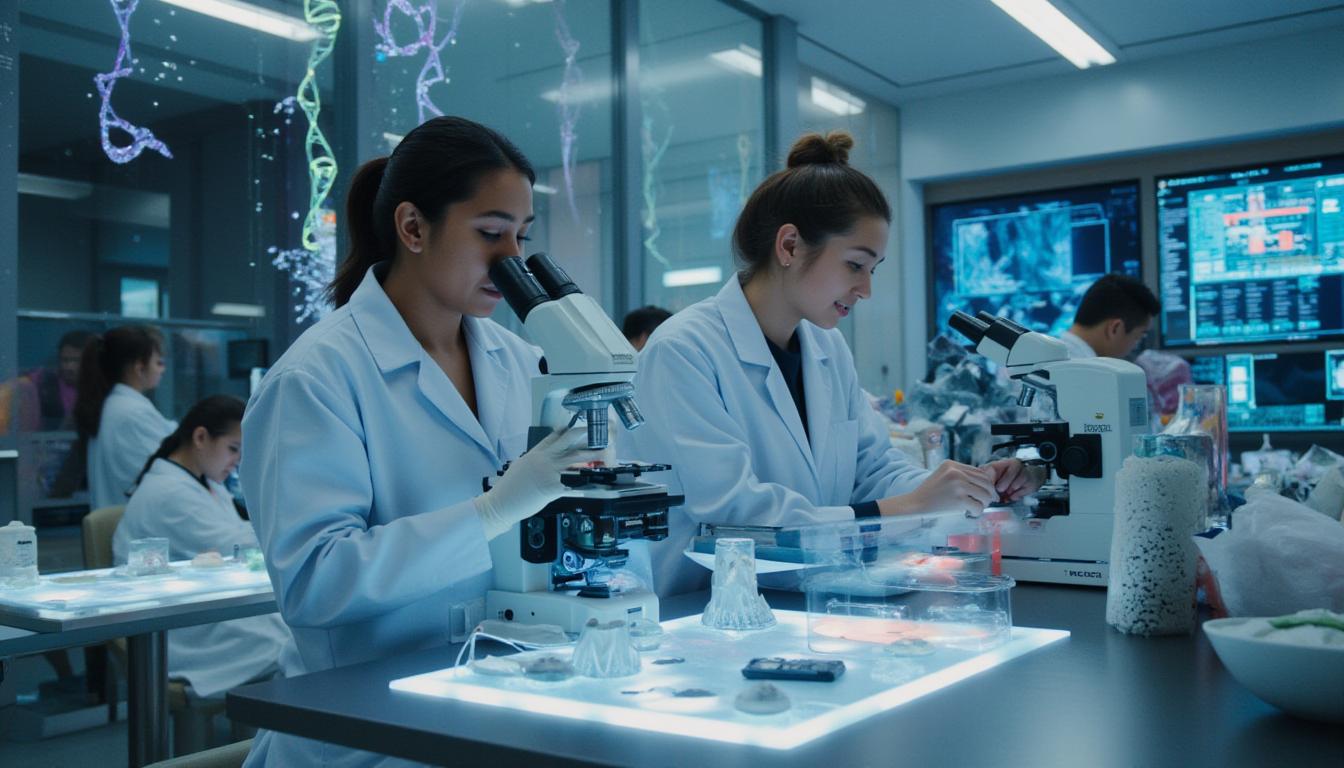Biotechnology Engineering Programs: Full Guide for Students
Biotechnology Engineering Programs

Biotechnology is one of the most rapidly growing and transformative branches of science and engineering. With the blending of biology, chemistry, technology, and engineering, biotechnology engineering programs are shaping the future of medicine, agriculture, environment, and industry. This comprehensive guide by MCSGOC will walk you through everything you need to know about biotechnology engineering—career opportunities, syllabus, admission process, skills required, and much more.
Introduction to Biotechnology Engineering
Biotechnology engineering is a multidisciplinary field combining biological sciences with engineering principles. It involves the use of living organisms and bioprocesses in engineering, technology, and medicine to develop products that improve human life and the environment.
Biotechnology engineering programs focus on cellular and biomolecular processes to develop technologies and products that help improve our lives and the health of our planet. From creating genetically modified crops to designing life-saving drugs, biotechnology engineers are at the forefront of innovation.
Why Choose Biotechnology Engineering?
Choosing biotechnology engineering as a career path opens up a wide range of opportunities:
- Innovative Field: Work on cutting-edge technologies in healthcare, agriculture, and environmental science.
- Diverse Career Options: Opportunities in research, pharmaceuticals, food production, agriculture, and more.
- Global Demand: Biotech professionals are in demand across the world.
- Interdisciplinary Learning: Integrates biology, chemistry, physics, and engineering.
Biotechnology Engineering Programs at a Glance
Biotechnology engineering programs typically span four years at the undergraduate level and two years for postgraduate courses. The curriculum combines theory with extensive laboratory work and research exposure.
Core Subjects Include:
- Molecular Biology
- Genetic Engineering
- Bioprocess Engineering
- Immunology
- Microbiology
- Biochemistry
- Bioinformatics
- Enzyme Technology
Electives May Include:
- Environmental Biotechnology
- Pharmaceutical Biotechnology
- Agricultural Biotechnology
- Nanobiotechnology
Career Opportunities After Biotechnology Engineering
Biotechnology engineers have a broad range of career paths to choose from. Some of the top career options include:
1. Biomedical Engineer
Work on the design and development of medical devices and diagnostics tools.
2. Genetic Engineer
Conduct research on gene therapy, DNA cloning, and genetic modification.
3. Research Scientist
Work in labs conducting experiments and contributing to scientific discoveries.
4. Clinical Research Associate
Oversee and manage clinical trials in pharmaceutical companies or hospitals.
5. Quality Control Analyst
Ensure the safety and quality of biotech products.
6. Biotech Product Manager
Manage the development, marketing, and sales of biotechnology products.
7. Environmental Biotechnologist
Use biotechnology for environmental cleanup, waste management, and sustainability.
Admission Process for Biotechnology Engineering Programs
1. Eligibility Criteria
- For B.Tech: Completion of 10+2 with Physics, Chemistry, Biology/Mathematics.
- For M.Tech: B.Tech degree in Biotechnology or related field.
2. Entrance Exams
- JEE Main
- State-level Engineering Entrance Exams
- MCSGOC Entrance Exams (for direct admission and scholarship options)
Skills Required for Biotechnology Engineering
To excel in biotechnology engineering programs, students must develop the following skills:
- Analytical and Research Skills
- Attention to Detail
- Problem-Solving Abilities
- Teamwork and Communication
- Technical Laboratory Skills
- Adaptability and Creativity
Top Recruiters in Biotechnology
Some leading recruiters for biotechnology engineering graduates include:
- Biocon
- Cipla
- Serum Institute of India
- Panacea Biotech
- Bharat Biotech
- Dr. Reddy’s Laboratories
- MCSGOC Research Collaborations
Biotechnology Engineering at MCSGOC
(MCSGOC) is a leading institution offering state-of-the-art biotechnology engineering programs. With advanced laboratories, experienced faculty, and industry tie-ups, MCSGOC provides students with hands-on experience, internships, and placement assistance.
Key Features:
- NAAC-accredited campus
- AICTE and AKTU-approved programs
- Research-driven curriculum
- Exchange programs and international collaborations
Future Scope of Biotechnology Engineering
The future of biotechnology is incredibly promising, with advancements in:
- Artificial intelligence in biotech
- CRISPR and gene editing
- Personalized medicine
- Vaccine development
- Sustainable biofuels and biodegradable plastics
Biotechnology engineering programs are evolving rapidly, and institutions like MCSGOC ensure students stay ahead of the curve.
Tips for Success in Biotechnology Engineering
- Stay updated with scientific journals and research papers
- Participate in biotech competitions and fests
- Intern at research labs or biotech companies
- Take up certification courses in bioinformatics, genomics, or AI in biotech
- Network with professionals through LinkedIn or biotech webinars
15 Frequently Asked Questions (FAQs)
Q1: What is biotechnology engineering?
A: It’s a branch of engineering that applies biology and technology for innovations in medicine, agriculture, and environment.
Q2: What are the eligibility criteria for biotechnology engineering programs?
A: 10+2 with PCM/PCB for B.Tech and B.Tech in biotech for M.Tech.
Q3: What are the subjects taught in biotechnology engineering?
A: Subjects include molecular biology, genetics, biochemistry, and bioinformatics.
Q4: Which colleges offer top biotechnology engineering programs?
A: MCSGOC is among the leading colleges with excellent infrastructure and placements.
Q5: What is the duration of the course?
A: 4 years for B.Tech and 2 years for M.Tech.
Q6: Are there job opportunities after biotechnology engineering?
A: Yes, in healthcare, agriculture, pharmaceuticals, and research.
Q7: Is biotechnology a good career option in India?
A: Absolutely! With the rise of biotech firms and government support, it’s booming.
Q8: How does MCSGOC support biotechnology students?
A: With internships, research projects, expert faculty, and global collaborations.
Q9: What is the average salary after completing the program?
A: Entry-level salaries range from INR 3-6 LPA, increasing with experience.
Q10: What are the skills required for biotechnology engineers?
A: Analytical skills, lab techniques, communication, and problem-solving.
Q11: Can I work abroad with this degree?
A: Yes, biotech engineers are in demand globally.
Q12: What industries hire biotechnology engineers?
A: Pharma, food tech, healthcare, environment, and research labs.
Q13: What are emerging fields in biotechnology?
A: Genomics, AI in biotech, nanobiotech, and synthetic biology.
Q14: Are there government jobs in biotechnology?
A: Yes, in organizations like DBT, ICMR, CSIR, and ISRO.
Q15: How do I get admission into MCSGOC’s biotechnology program?
A: Apply online through the official portal or appear in the entrance exam.
Conclusion
Biotechnology engineering programs are the gateway to a future filled with innovation and impact. Whether you’re passionate about medical research, sustainable agriculture, or solving global challenges, this field offers limitless possibilities. With institutions like MCSGOC offering world-class education and training, your journey into the world of biotechnology begins on solid ground.
So, if you’re an aspiring student looking to build a career that blends science, technology, and societal impact—biotechnology engineering programs are your calling.
Read More: Top 10 Best Engineering Colleges in Lucknow 2025 | MCSGOC







